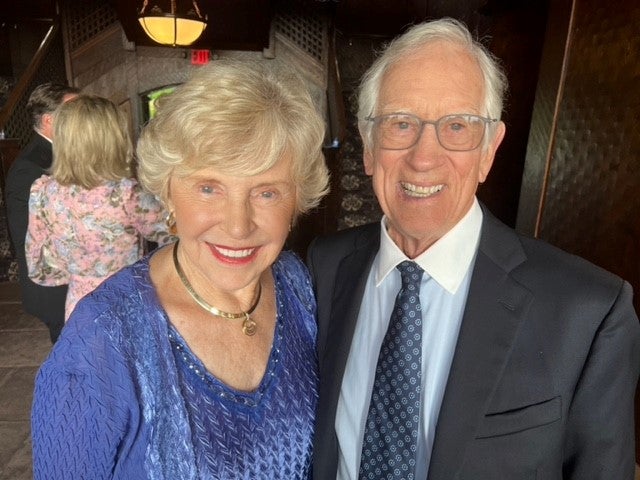A Lifelong Commitment to Supporting Native American Scholarship
For Allen Ivey EdM ’57, EdD ’59, a pioneer in culturally sensitive psychology, watching his parents welcome citizens of the Swinomish Indian Tribal Community into their lives in Mount Vernon, Washington, left an impression that put him on a path of embracing multiculturalism. This formative childhood experience has shaped his career as an educator and counselor, as well as his philanthropy.
Since 2013, Allen and his wife, Mary, also a highly accomplished counselor, have been leading supporters of Harvard University’s Native American Program (HUNAP), which provides community, scholarship, and resources for the more than 335 Indigenous-identifying students currently studying at Harvard and more than 1,400 Indigenous alumni. Through outright gifts and creative contributions to the Allen and Mary Ivey Fund for the Native American Program at Harvard University, including a charitable remainder trust funded by real estate and intentions to further support HUNAP as their central charitable contribution, the Iveys are continuing a lifelong connection with Indigenous communities and inspiring others to support opportunities for Native American students.
“Support from alumni and friends, including Allen and Mary, has been crucial in HUNAP’s growth,” said Joseph Gone AB ’92, professor of anthropology and of global health and social medicine at Harvard University and faculty director of HUNAP. “We are grateful for their commitment to ensuring Indigenous-identifying students thrive at Harvard and have the resources they need to make an impact in Native communities across the country.”

What brought you to Harvard as a graduate student?
Allen Ivey: In my senior year as an undergraduate at Stanford, I was selected to go to Harvard for a summer conference for student council members. I got to Cambridge and was immediately attracted to Harvard. When it came time to apply to master’s programs, I knew Harvard was the place for me. My first year at the Graduate School of Education was all academics, and the second and third years I got my doctorate while working at Boston University.
How has your connection to and support of Native American communities changed over time?
Mary Ivey: We both come from areas with large Native American populations and had regular contact with folks in these communities. I’m from Bemidji, Minnesota, on three reservations, and I remember going to powwows with my babysitter and there were a lot of Native American students at my school. The original charter for Harvard back in 1650 noted that there was supposed to be an Indian College at the University too, and there was for a bit, but for centuries there were very few Indigenous students studying here. It’s great that Harvard is now recognizing and embracing its Native American roots and heritage through HUNAP.
Allen: My folks ran a small grocery store in Mount Vernon and modeled great behavior getting involved with the Swinomish Nation, attending powwows and welcoming the Samish people, as well as some field workers who immigrated from Mexico, into their home and store, when other neighbors and customers weren’t as welcoming. That rubbed off on me. I give them a lot of credit for my interest in both multiculturalism and social justice.
What inspired you to give back to Harvard, and HUNAP specifically, both during your lifetime and by leaving a legacy in your estate plans?
Mary: We wanted to donate to something that’s meaningful to us, and HUNAP matches our interests and has enhanced our experience with Harvard. We’ve been back for powwows and graduations; we even received an award. It makes you closer to the University when you’re donating and being part of a group. It’s a win-win when you give to a program like HUNAP.
Allen: Harvard has gathered a substantial group of Native American and Indigenous scholars from across the University at HUNAP, led by Faculty Director Joseph Gone, who has done a great job. It’s exciting to see the commitment from the University, and as the time comes—and it will continue—we want to support HUNAP as much as possible.
What are your hopes for the Allen and Mary Ivey Fund for the Native American Program at Harvard University?
Allen: More students and more emphasis. Native American folks are often ignored by our government, and it would be easy to get bitter if you wanted to, but there is a lot of enthusiasm. We like the way things are going with HUNAP and what Harvard is doing to support this population, including funding travel for Indigenous students to conduct research at Native Nations across the county and unveiling a portrait of Caleb Cheeshahteaumuck AB 1665, the first Native American to graduate from Harvard.
Mary: It has been so fun to be invited to campus for the graduations of students involved in HUNAP. Often the whole family comes and you think about how this person now has a Harvard degree and the know-how to really make a difference in their own community. There are so many more students in the program than when we started and a lot of them are the first ones in their family to go to college, let alone Harvard. The work they do is remarkable and is making a difference in our country.
If you would like to learn more about making a difference at Harvard through your estate plans, or other creative ways to give, please contact Harvard Gift Planning.